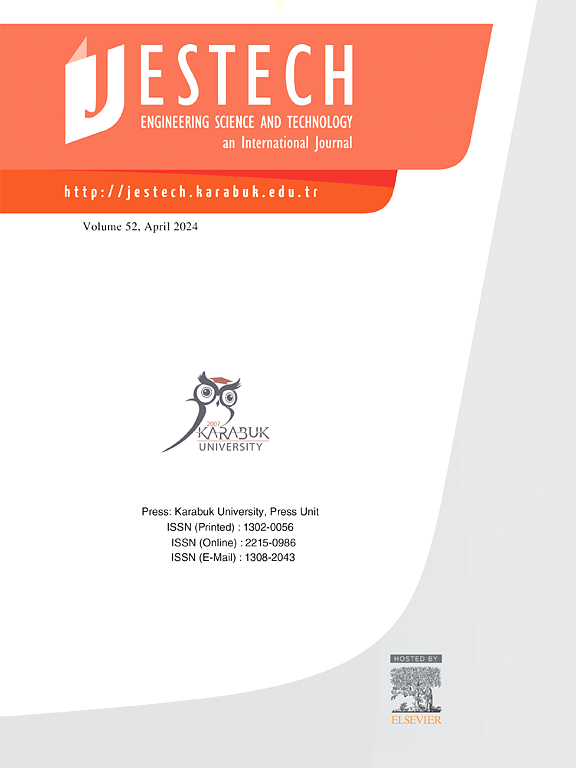用于抽水应用的混合可再生能源集成储能系统的现代进展
IF 5.1
2区 工程技术
Q1 ENGINEERING, MULTIDISCIPLINARY
Engineering Science and Technology-An International Journal-Jestech
Pub Date : 2025-02-01
DOI:10.1016/j.jestch.2025.101967
引用次数: 0
摘要
本文对混合可再生能源抽水系统(HREWPS)进行了全面的综述,该系统将可再生能源(如光伏(PV)系统和风力涡轮机(WTs))与抽水技术相结合,为偏远和离网地区的供水提供可持续和高效的解决方案。该研究探讨了HREWPS的技术和操作方面,包括组件、系统配置、储能集成和控制方法。讨论的基本领域包括光伏水泵系统(PVWPS),重点是太阳能电池技术,DC-DC转换器,电机泵配置和最大功率点跟踪(MPPT)技术;风能水泵系统(WEWPS),分析风力涡轮机设计、电机-泵兼容性和混合配置;能源存储系统(ess),包括电池技术、水箱和混合存储解决方案,以提高可靠性和减轻可再生能源的间歇性。该手稿还强调了人工智能(AI)在优化能源管理、预测灌溉需求和提高运营效率方面的整合。此外,在提高系统可持续性和降低运行成本的背景下,讨论了能源存储的最新进展,例如电池和超级电容器的混合配置。来自不同地理位置的案例研究表明,HREWPS的经济和环境效益,包括温室气体排放的显著减少和农业生产力的提高。尽管具有潜力,但可再生能源的间歇性、最佳规模和成本效益等挑战也得到了解决。最后,该研究确定了现有研究中的差距,并提出了未来的方向,例如整合制氢、先进的人工智能算法和创新的储能技术,以进一步提高HREWPS的可行性和影响力。本文章由计算机程序翻译,如有差异,请以英文原文为准。
Modern advancements of energy storage systems integrated with hybrid renewable energy sources for water pumping application
This manuscript provides a comprehensive review of hybrid renewable energy water pumping systems (HREWPS), which integrate renewable energy sources such as photovoltaic (PV) systems and wind turbines (WTs) with water pumping technologies to offer sustainable and efficient solutions for water supply in remote and off-grid areas. The study explores the technical and operational aspects of HREWPS, including components, system configurations, energy storage integration, and control methodologies. Basic areas discussed include photovoltaic water pumping systems (PVWPS), with a focus on solar cell technologies, DC-DC converters, motor-pump configurations, and maximum power point tracking (MPPT) techniques; wind energy water pumping systems (WEWPS), analyzing wind turbine designs, motor-pump compatibility, and hybrid configurations; and energy storage systems (ESSs), covering battery technologies, water tanks, and hybrid storage solutions to enhance reliability and mitigate renewable energy intermittency. The manuscript also highlights the integration of artificial intelligence (AI) to optimize energy management, predict irrigation demands, and improve operational efficiency. Additionally, recent advancements in energy storage, such as hybrid configurations of batteries and supercapacitors, are discussed in the context of enhancing system sustainability and reducing operational costs. Case studies from diverse geographical locations demonstrate the economic and environmental benefits of HREWPS, including significant reductions in greenhouse gas emissions and increased agricultural productivity. Despite their potential, challenges such as renewable energy intermittency, optimal sizing, and cost-effectiveness are addressed. The study concludes by identifying gaps in existing research and proposing future directions, such as integrating hydrogen generation, advanced AI algorithms, and innovative energy storage techniques to further enhance the feasibility and impact of HREWPS.
求助全文
通过发布文献求助,成功后即可免费获取论文全文。
去求助
来源期刊

Engineering Science and Technology-An International Journal-Jestech
Materials Science-Electronic, Optical and Magnetic Materials
CiteScore
11.20
自引率
3.50%
发文量
153
审稿时长
22 days
期刊介绍:
Engineering Science and Technology, an International Journal (JESTECH) (formerly Technology), a peer-reviewed quarterly engineering journal, publishes both theoretical and experimental high quality papers of permanent interest, not previously published in journals, in the field of engineering and applied science which aims to promote the theory and practice of technology and engineering. In addition to peer-reviewed original research papers, the Editorial Board welcomes original research reports, state-of-the-art reviews and communications in the broadly defined field of engineering science and technology.
The scope of JESTECH includes a wide spectrum of subjects including:
-Electrical/Electronics and Computer Engineering (Biomedical Engineering and Instrumentation; Coding, Cryptography, and Information Protection; Communications, Networks, Mobile Computing and Distributed Systems; Compilers and Operating Systems; Computer Architecture, Parallel Processing, and Dependability; Computer Vision and Robotics; Control Theory; Electromagnetic Waves, Microwave Techniques and Antennas; Embedded Systems; Integrated Circuits, VLSI Design, Testing, and CAD; Microelectromechanical Systems; Microelectronics, and Electronic Devices and Circuits; Power, Energy and Energy Conversion Systems; Signal, Image, and Speech Processing)
-Mechanical and Civil Engineering (Automotive Technologies; Biomechanics; Construction Materials; Design and Manufacturing; Dynamics and Control; Energy Generation, Utilization, Conversion, and Storage; Fluid Mechanics and Hydraulics; Heat and Mass Transfer; Micro-Nano Sciences; Renewable and Sustainable Energy Technologies; Robotics and Mechatronics; Solid Mechanics and Structure; Thermal Sciences)
-Metallurgical and Materials Engineering (Advanced Materials Science; Biomaterials; Ceramic and Inorgnanic Materials; Electronic-Magnetic Materials; Energy and Environment; Materials Characterizastion; Metallurgy; Polymers and Nanocomposites)
 求助内容:
求助内容: 应助结果提醒方式:
应助结果提醒方式:


